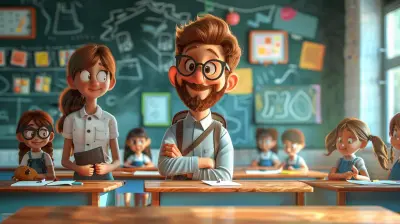Are Video Games Helping or Hurting Your Child's Education?
27 September 2025
Video games have been a hot topic in parenting debates for years. Some say they rot kids' brains, while others argue they enhance learning and problem-solving skills. So, what’s the truth? Are video games helping or hurting your child’s education? The answer isn’t as black and white as you might think.
Let’s dive deep into the real impact of video games on learning, breaking down the good, the bad, and how to strike a healthy balance.
🎮 The Case for Video Games: How They Benefit Learning
Many parents worry that video games are a waste of time, but research suggests otherwise. When used wisely, gaming can offer surprising educational benefits.1. Boosting Critical Thinking & Problem-Solving
Video games aren’t just about pressing buttons aimlessly. Many require players to think critically, solve puzzles, and strategize.- Games like Minecraft teach kids about resource management, creativity, and even basic engineering principles.
- Strategy games like Civilization or Age of Empires encourage logical thinking and historical awareness.
These games require kids to make quick decisions, analyze situations, and adapt—skills that are valuable in academics and life.
2. Enhancing Memory & Cognitive Skills
Ever seen a kid memorize a hundred Pokémon names but struggle with their schoolwork? That’s because video games often engage memory and cognitive recall in powerful ways.Educational games like Brain Age or Big Brain Academy are designed to challenge and enhance memory, problem-solving, and even math skills. Even action games improve reaction times, pattern recognition, and spatial awareness.
3. Encouraging Reading & Storytelling
Many video games come with rich, immersive stories. Role-playing games (RPGs) like The Legend of Zelda or Final Fantasy require deep reading comprehension and encourage storytelling skills.Kids often read dialogue, follow narratives, and infer meaning—all things that boost literacy. Some games even inspire kids to write their own stories.
4. Fostering Social Skills & Teamwork
Contrary to the stereotype of the isolated gamer, many kids use video games as a way to socialize. Multiplayer games like Fortnite or Among Us require teamwork, communication, and collaboration.For kids who struggle with in-person interactions, gaming can be a great way to build confidence and friendships.
🚦 The Downsides: How Video Games Can Hurt Learning
While video games can be beneficial, they also have potential downsides, especially if overused or not monitored.1. The Distraction Factor
Let’s be real—video games can be addicting. If a child is spending hours gaming instead of doing homework, their education will suffer.Some kids get so immersed that they procrastinate on assignments, leading to poor grades and missed deadlines. The key here is moderation—gaming should never replace studying.
2. Reduced Attention Span
Studies suggest that excessive gaming can shorten attention spans. Fast-paced games train the brain to focus in short bursts, making it harder for kids to concentrate on long tasks, like reading a book or writing an essay.If your child seems impatient or restless during schoolwork, excessive gaming may be a culprit.
3. Lack of Physical Activity
A sedentary lifestyle is a big concern. Kids who spend too much time gaming may neglect exercise, leading to health issues like obesity or poor posture.It’s essential to encourage a balance between screen time and physical activity—perhaps by setting a rule where they need to play outside before getting screen time.
4. Exposure to Inappropriate Content
Not all video games are suitable for kids. Many contain violence, mature themes, or even aggressive online interactions. Without proper monitoring, children can be exposed to content that isn’t age-appropriate.5. Sleep Disruptions
Late-night gaming can affect sleep patterns. Bright screens and intense gameplay can trick the brain into staying awake longer, leading to sleep deprivation.A lack of sleep can hurt focus, memory, and overall academic performance. A good rule of thumb? No screens at least an hour before bedtime.
⚖️ Striking the Right Balance
So, how do you make sure video games help rather than hurt your child’s education? Here are some practical strategies:✅ Set Time Limits
Screen time limits are crucial. The American Academy of Pediatrics recommends no more than one to two hours of recreational screen time per day.Use parental controls or apps to manage their gaming time if needed.
✅ Choose Educational Games
Not all games are created equal. Opt for ones that encourage learning, creativity, or problem-solving. Some great options include:- Minecraft: Education Edition (teaches STEM concepts)
- Kerbal Space Program (introduces physics and engineering)
- TypingClub (improves typing skills)
Let your child play games that stimulate their brain rather than just provide mindless entertainment.
✅ Encourage Balanced Activities
Make sure your child’s day isn’t all about gaming. Encourage outdoor play, reading, hobbies, and social activities. A well-rounded routine makes gaming less of an academic threat.✅ Play Together
One of the best ways to monitor gaming content and interaction? Play with your child!Co-playing allows you to engage in their world, understand what they are experiencing, and even turn game time into a bonding experience.
✅ Prioritize Homework & Chores First
A good rule is "Work first, play later." Set up a routine where homework and responsibilities come before gaming time.✅ Monitor Online Interactions
If your child plays multiplayer games, keep an eye on their online interactions. Teach them about online safety, digital etiquette, and the importance of not sharing personal information.
🏁 Final Thoughts
So, are video games helping or hurting your child’s education? The truth is—it depends on how they’re used.When balanced correctly, gaming can enhance learning, improve cognitive skills, and even boost creativity. However, excessive gaming, exposure to inappropriate content, and neglecting responsibilities can have negative effects.
As a parent, you have the power to guide this balance. Monitor their gaming habits, set healthy limits, and encourage learning-based play. After all, video games are just like any tool—they can be beneficial or harmful depending on how they’re used.
At the end of the day, it’s all about moderation. So, next time your child picks up the controller, ask yourself: *Are they playing the game, or is the game playing them?
all images in this post were generated using AI tools
Category:
Tech And KidsAuthor:

Noah Sawyer
Discussion
rate this article
1 comments
Jolene Cain
Video games can offer both benefits and drawbacks for children’s education. While they can enhance problem-solving skills and teamwork, excessive play may hinder academic performance. Balance is key for effective learning.
September 30, 2025 at 2:37 PM

Noah Sawyer
Thank you for your insightful comment! I completely agree that balance is essential; video games can be valuable educational tools when used in moderation.


